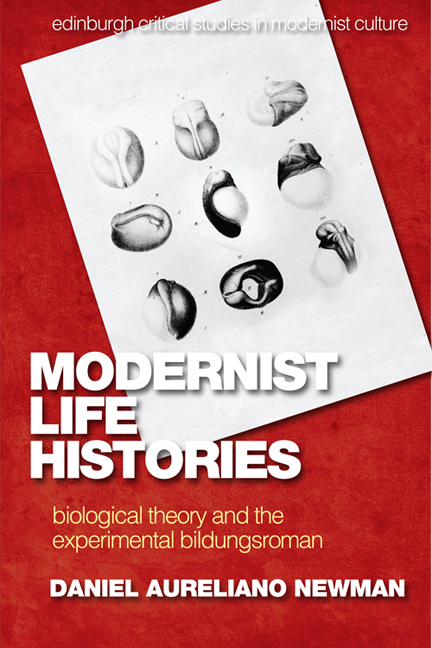Book contents
- Frontmatter
- Contents
- List of Figures
- Preface
- Acknowledgements
- Series Editors’ Preface
- List of Abbreviations
- Introduction
- 1 Bildung, Biology and the Narrative Structure of Development
- 2 A Portrait of the Artist as a ‘Biologist in Words’: Language, Epiphany and Atavistic Bildung
- 3 Mendelian Inheritance, ‘Eternal Differences’ and Entropy in Howards End
- 4 ‘Tampering with the Expected Sequence’: Heterochrony and Sex Change in Orlando
- 5 Anachrony, Neoteny and the ‘Education of an Amphibian’ in Eyeless in Gaza
- 6 Beginning Again: Darwin’s Caterpillar from George Eliot to Beckett
- Conclusion
- Bibliography
- Index
Introduction
Published online by Cambridge University Press: 23 April 2021
- Frontmatter
- Contents
- List of Figures
- Preface
- Acknowledgements
- Series Editors’ Preface
- List of Abbreviations
- Introduction
- 1 Bildung, Biology and the Narrative Structure of Development
- 2 A Portrait of the Artist as a ‘Biologist in Words’: Language, Epiphany and Atavistic Bildung
- 3 Mendelian Inheritance, ‘Eternal Differences’ and Entropy in Howards End
- 4 ‘Tampering with the Expected Sequence’: Heterochrony and Sex Change in Orlando
- 5 Anachrony, Neoteny and the ‘Education of an Amphibian’ in Eyeless in Gaza
- 6 Beginning Again: Darwin’s Caterpillar from George Eliot to Beckett
- Conclusion
- Bibliography
- Index
Summary
It is … very odd to find all the little follies and virtues, and developments and retrogressions, written out in the big world's book that you find in your little internal self.
– Olive Schreiner, Story of an African Farm (1999: 165)Modernist fiction radically reimagines human development. It offers, in most critical accounts, a bleak picture of wasted potential, stunted growth, perpetual adolescence, or premature senescence. This book offers a different perspective: rather than failed development, new kinds of development. If they look like failures, it may be because our understanding of growth and self-formation is, even today, shaped by a particular model of organic change which arose in the nineteenth century. Linear, accretive and above all progressive, this model seems so natural that other ways to chart a life are almost unimaginable.
This model is memorably captured in Aldous Huxley's Point Counter Point (1928), when the pregnant Marjorie Carling considers ‘the astounding process of creation’ unfolding within her:
Something that had been a single cell, a cluster of cells, a little sac of tissue, a kind of worm, a potential fish with gills, stirred in her womb and would one day become a man – a grown man, suffering and enjoying, loving and hating, thinking, remembering, imagining. And what had been a blob of jelly within her body would invent a god and worship; what had been a kind of fish would create and, having created, would become the battle-ground of disputing good and evil; what had blindly lived as a parasitic worm would look at the stars, would listen to music, would read poetry. A thing would grow into a person … (PCP 2)
The life of Marjorie's unborn son, progressing from a ‘single cell’ to ‘a human body, a human mind’ (PCP 3), from bodily formation to aesthetic and spiritual maturity, is plotted as both a primer in nineteenth-century embryology and a Victorian Bildungsroman. Its path and end are as optimistic as they are confident in the future course of the unborn child. Yet Marjorie feels ‘only of sickness and lassitude’ (PCP 3), and the following 500 pages strongly suggest that the narrator's optimism is rank with sarcasm.
- Type
- Chapter
- Information
- Modernist Life HistoriesBiological Theory and The Experimental Bildungsroman, pp. 1 - 27Publisher: Edinburgh University PressPrint publication year: 2018

